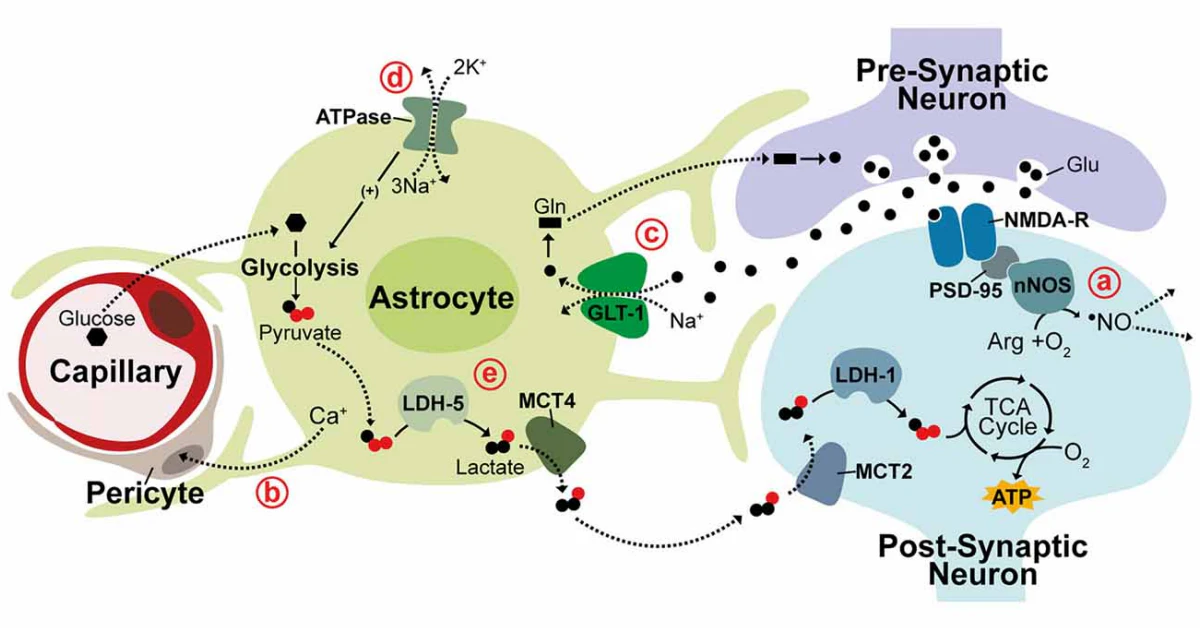Ever found yourself zoning out during a conversation because your brain feels like it’s running on empty? (Yeah, me too.) Turns out, your brain’s relationship with sugar isn’t as simple as “glucose in, energy out.” A groundbreaking discovery shows that neurons have a totally unique way of burning sugar, and this could help protect us from Alzheimer’s and dementia. Who knew?
Here’s the kicker: This isn’t just about souping up your brain power. It’s about how brain sugar metabolism might hold the key to staving off neurodegenerative diseases. But don’t worry—we’ll keep this chill, real, and brimming with facts you can actually use. Let’s dive in together.
Why Brain Sugar Matters
You know that brain fog when you skip meals? That’s your brain essentially yelling, “Feed me steady fuel!” Brain sugar metabolism is the unsung hero of mental clarity, focus, and—get this—even our long-term health. Researchers at the Buck Institute for Research on Aging recently found that neurons break down glycogen (a stored form of glucose) in ways no one ever expected. And that’s got scientists geeking out over how this might help fight dementia. Let’s unpack that nerd stuff in a way that feels personal, yeah?
Can Your Brain’s “Fuel” Protect You From Disease?
Alright, imagine you’re in a race, but your brain’s not getting steady energy. It’s like the engine in you’re driving full speed up a mountain with a leaky gas tank. That’s kind of what happens in neurodegenerative diseases: the brain’s glucose processing goes haywire. The Buck Institute’s study, published in Nature Metabolism, thinks glycogen breakdown might actually be the brain’s backup generator, stepping in when glucose levels dip. This process could slow down the sticky protein buildup that leads to Alzheimer’s.
You ask, “Yeah, but how does that help me?” Well, turns out this discovery opens up whole new paths for treatment. Big-picture stuff, but we’ll get to smaller, actionable steps later. First, let’s get why this sciencey twist really matters.
What Does Brain Sugar Metabolism Actually Do?
Gotta keep it real: Glucose is brain food. Not the candy bar kind (that’s the bad kind), but the steady, manageable fuel type stuff. Your neurons burn through about 5.6 mg of glucose every minute—seriously, your gray matter is the most energy-hungry part of your body. But neurons don’t store it like muscles do. They dance with glycogen in a totally different way. This quirky metabolism might protect neurons when glucose is scarce—like during sleep or meal gaps—which, long-term, could slow down dementia’s creep.
Here’s the downside: When this system gets glitched—like in Alzheimer’s—your neurons starve and die. Imagine your brain trying to send electricity down a burnt fuse. Not good. The NIH has even found that Alzheimer’s proteins sabotage glucose in the brain, adding a whole new layer to our sweet spot problem.
The Glucose-Disease Link
Hold up. What if one of the most common things in your body—glucose—is quietly linked to one of the scariest trends in health? Alzheimer’s, dementia, and other neurodegenerative diseases all tie subtly to how your brain manages sugar. So let’s get into it.
Why Is a Sugar Shortcut Risky business?
Neurons need balanced brain sugar metabolism for smooth sailing. But once things tip toward overuse or blockage of glucose, it’s like hitting a pothole on the road to healthy cognitive aging. Studies have connected irregular brain glucose use with the buildup of toxic proteins like amyloid-beta and tau, the codes behind Alzheimer’s chaos. And the worst part? This isn’t just something old folks should worry about. Keep your brain’s glucose levels steady now, and—survivor’s tip—it may pay dividends later.
How It All Collapses
Ever been so exhausted your brain just shuts down for 5 minutes? That’s not far off from what happens during glucose deprivation. Without adequate fuel, neurons sleepwalk metaphorically—and in severer cases, they flat-out stop talking. This isn’t just a “brain fog” issue; over time, it’s a full-blown degeneration starter motor. Gladstone and UCSF have shown how glucose metabolism fuels neuronal activity and keeps your brain chemistry humming. Mess with that balance, and whoaaaaa.
| Brain State | Glucose Usage Rate | Neurological Risk |
|---|---|---|
| Healthy Adult | 20% of total glucose | Low risk of cognitive decline |
| Developing Child | ~2x higher than adults | Hypoglycemia risk (especially under 10) |
| Alzheimer’s | ↓ Significantly reduced | ↑ Protein buildup and neural loss |
Unbalanced brain sugar metabolism? Not just a momentary drain—it’s slowly training your brain to break down. Not okay.
Fueling Your Brain with Lifestyle
Alright, let’s pivot from lab coats to things you can do without a doctorate: lifestyle changes. Surprise—your hobbies, snacks, and even your Zzz vibe can bang up or dampen your brain’s metabolism game. If you’ve ever wondered if a dip in the pool could save your memory… let’s look at the real science behind that idea.
Could Swimming Be Your Brain’s New Best Friend?
If you’ve never tried aquatic laps just for brain health, you might want to after this. Turns out, swim training doesn’t just tax your muscles—it’s a therapy for your brain. A/Prof Garron Dodd and his crew at the University of Melbourne have repeatedly found links between swimming and neuroprotection. Let me translate: the brave souls who swam regularly in Dodd’s studies showed less oxidative damage—a type of brain rust that isn’t good for memory or mood.
How The Sweet Science Sinks Into the Data
When Dodd’s lab put brain slices through oxygen and glucose shortages, guess what? The swim-trained ones stayed resilient. Your brain, under glucose deprivation—think crash diets or head injuries—starts unraveling. But the slices with swimmers’ logs of laps were like, “Nah, not today.”
What You Eat Could Be Sweet or Sad
Okay, confession: I (like many of you) used to binge sugary stuff for that jolt of focus. Turns out, that’s a zero-sum game. Your brain thrives on stability, not rollercoaster sugar rides. So what is the sweet spot? Let’s talk metabolism, not just macros.
- Berries: Packed with flavonoids—a study in Antioxidants MDPI claims hesperetin may protect neurons by counteracting oxidative stress.
- Leafy Greens: Got nitrates that may directly support glycogen regulation. Told you it’s a weird word, but stick with me.
- Swim & Snack Tip: Carbs before a session? Maybe, but lean into complex stuff—oats, not Oreos.
Junk food? Feel “balanced”? Nope. Studies say too much processed sugar can damage brain capillaries and slow blood flow. The hormonal tug-of-war is wild too—insulin, glucose, and memory have an intimate dance that gets real messy when sugary chaos kicks in.
Balance: Sweet Spot or Health Tripwire?
No, really: when it comes to brain sugar metabolism, balance is everything. Too much glucose floods the system, too little starves your brain, and you wind up in trouble. The brain’s like a nitro engine: you need just the right mix. Let’s dissect the due diligence.
Is Your Brain Running on Empty Too Often?
Yep, hypoglycemia is no joke. Ever felt dizzy after skipping breakfast? Your brain was basically powering down. Long-term dips, especially in aging brains or post-menopausal brains, weaken connections that matter for memory. Dodd’s lab even looked at how “glucose sensing” neurons help track your body’s fuel needs—you don’t want those mechanisms jammed shut by unnatural highs or lows.
On the flip side: too much glucose (think diabetes or hyperinsulinemia) can cause glycation—an ugly process that forms brain toxins. Not cute. Strengthen your metabolism to avoid either extreme balancing each other out on the “danger meter.”
But Wait—Does Age Twist the Connection?
Kids’ brains? Supercharged. Until around age 10, their glucose needs sky-rocket, driving wild brain growth. But with age comes less use of glucose and higher vulnerability to sugar jabs. Don’t tune this out—it applies to your parents, your future self, and how we can all reshape the sugar story for younger and older generations studies strongly suggest.
Translation? Kids need controlled sugar flow to grow brains, and adults need protection from overloads. We all need balance—but how? That brings us to…
Walking the Path Forward
I know this stuff’s heavy, but here’s the hope: the science is newer than our grandparents’ cookbooks, but it’s already inspiring change. Metabolic neuroscience is a subhead of what we call “future medicine”—and Dodd’s kind of building the roadmap here.
What’s the Potential of Glycogen Science?
Cool word alert: glycogen breakdown in neurons might be the clutch player for brain health. Let me explain. Neurons don’t play by the same rules—you already know they have quirky little abilities no one predicted. Until this study blew the hood up, neuroscientists thought neurons left glycogen breakdown to liver cells or muscles. Big takeaway: moderating that glycogen process might stabilize things—imagine a shock absorber for your brain.
Now, research isn’t ready for grandma’s dementia cure, but labs worldwide are on it. Better understanding of this pathway could lead to targeted treatments that skip the pill aisle. Or at least open your eyes to why trendy fads like keto or fasting might stab at better outcomes without solving it directly.
What’s Your Role in This Story?
Full reminder: you don’t need a medical degree to start now. Simple changes—like building regular sit-down meals into your routine, adding energy-boosting aerobic habits like swimming, and steering clear of ultra-processed whatevers—can stabilize your brain’s sugar system. Everything about metabolic health trickles up to cognitive HQ. The Stanford team even said, “sugar levels shape brain activity in real-time,” which gives all of us people a reason to slow down with post-lunch shakes or midnight cookie cravings.
Question for the reader: Next time your brain feels sluggish, will you reach for a candy bar—or think about how to fuel it smart? Let’s talk about that below.
What Should You Take Away?
Brain sugar metabolism might seem like a snooze title until you’re suddenly forgetting names like your phone has an app for that. This goes beyond generic health talk: it’s a glimpse into how your brain’s fuel system could define its long-term fate. Moving from “random carbohype” to real metabolic science is the smart play.
We’ve got Dodd’s swim studies on one side, the NIH’s findings on a sugar-starved brain, and Gladstone’s work mischievously hinting that neurons aren’t just passive oxygen chugs—they’re reactive, adaptable, and secretly in cahoots with your lifestyle choices. Even if you can’t overhaul your habits today, understanding the link between brain sugar metabolism and dementia gives you a way to start compromising with your cravings while pushing toward prevention.
Sharing this? Tag someone who needs to hear it or message me with a question. If you missed it up top: the brain uses about 20% of your body’s sugar. Your role isn’t just pushing pills or following flashy brain diet plans. Just start low-key, keep your flow smooth, and know that if you balance glucose, your brain will sing praises.
So what’s your take—will you swap out sugar-heavy snacks for something steady? Add a swim, a jog, or just a deeper mental pause before ordering takeout? Let me know—we’re all just trying to keep our heads in the game up here.
All these findings add up to one truth: we get to choose how we power our minds. And investing that wisely might pay off in memory, clarity, and wisdom as we age.
Stay curious. Stay kind to your brain.
– A Writer Investigating the Dirty Little Secret Behind Sustained Mental Energy


















Leave a Reply
You must be logged in to post a comment.